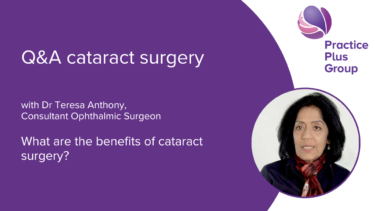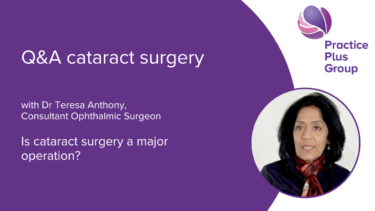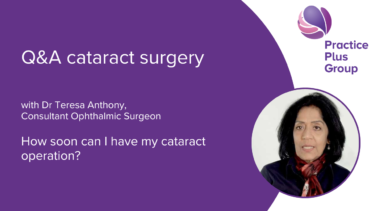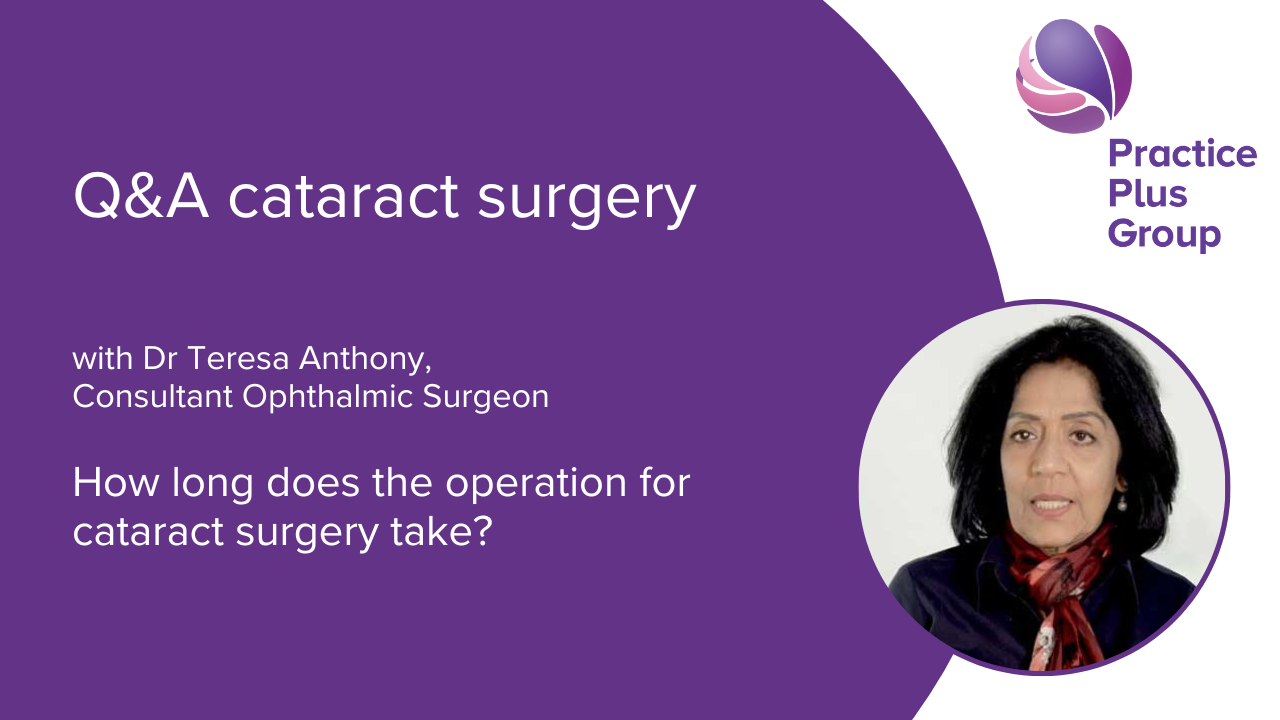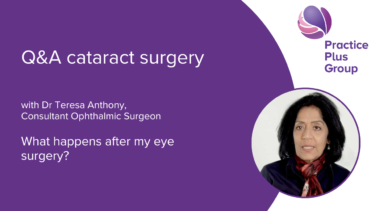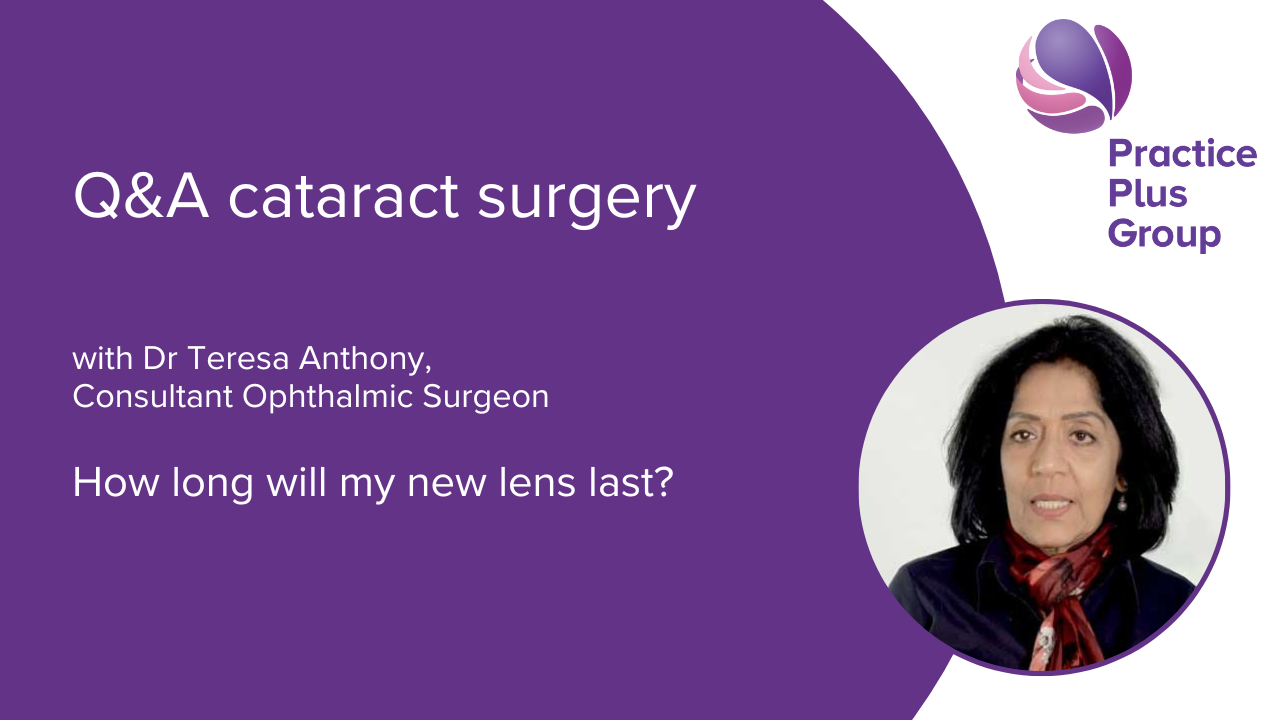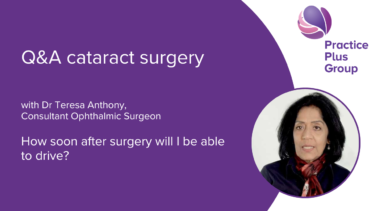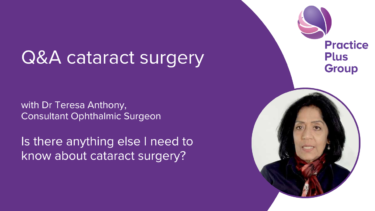Expert cataract surgery
at Rochdale Ophthalmology
- From £47 per month*
- Cataract surgery within 2 weeks**
- Premium lenses available

5,000+

treatments carried out last month
Outstanding

or 'Good' ratings by CQC
100%

clean record for hospital acquired infections
97%

of patients recommend Practice Plus Group
Address
Practice Plus Group Ophthalmology, Rochdale Croft Shifa Health Centre, Belfield Road, Rochdale OL16 2UP
Get directions to RochdaleContact Us
Opening Hours
Our opening hours are 8.30am-5pm Monday to Friday.


Private eye surgery at a glance
- Waiting time: 2-4 weeks
- Cost: £749-£3,599
- Ways to pay: self-pay, insured, finance options
- Hospital stay: same-day or in-patient
Cataract surgery waiting times
At Practice Plus Group, the average waiting time for private cataract surgery is 2-4 weeks following initial consultation.
What is eye surgery?
Eye surgery is any surgical operation performed on the eye. It is usually performed by an ophthalmologist – a doctor specially trained in eye care. Ophthalmologists diagnose and treat eye conditions through medicine or surgery.
Which eye problems require surgery?
The following eye issues are typically resolved with surgery:
- cataracts
- glaucoma (in the most complex cases)
- detached retinas
- retinal tears
- diabetic retinopathy (in the most complex cases)
- nearsightedness or farsightedness (also called refractive surgery).
Eye surgery types and options
Our eye specialists offer different eye surgery options or treatments for a wide range of common eye problems.
There are many eye operation types and treatments for various eye conditions. Please see below all of the eye treatments we offer at Practice Plus Group. Why not take a look at our Q&A video with Consultant Ophthalmologist Teresa Anthony which may answer some of the questions you might have about eye surgery.
Cataract surgery
Cataract treatment is a surgical procedure to remove the lens which has become cloudy and replace it with an artificial lens or intra-ocular lens (IOL). The procedure is typically performed on an outpatient basis and does not require an overnight stay in the hospital. Learn more about the signs of cataracts.
Laser procedures
Laser treatment for post-cataract, capsular clouding, is a treatment that is used to improve the vision post-surgery. It is very common and helps to let light pass through the cloudy regions of the lens capsule that may develop after the initial cataract surgery.
Nowadays, laser eye treatment is increasingly used to treat glaucoma patients. It works by decreasing the amount of fluid within the eye. This works by either increasing the drainage of fluid out of the eye or reducing the amount of fluid that is made.
Oculoplastics
Oculoplastics covers a wide range of surgical procedures that deal with the eye socket, eyelids, tear ducts and face. It also deals with the reconstruction of the eye and its associated structures.
Wet AMD
Wet AMD is a painless eye condition that leads to the gradual loss of central vision due to abnormal blood vessel growth. It can be treated with medication and in some cases laser surgery.
Adult general ophthalmology
We treat a wide variety of eye conditions affecting all parts of the eye or eyelids. These can be medical conditions e.g. blepharitis, dry eye, retinal conditions or conditions needing surgery such as Entropion or Ectropion.
Glaucoma service
Glaucoma affects approximately 1 per cent of the whole population, it is a common eye disease which needs lifelong care, usually medical and occasionally surgical (or laser). Find out more about our glaucoma service.
Preparing for your eye operation
Eye surgery preparation is straightforward. Once you have been referred for surgery you will meet with a specialist eye clinician who will go through your symptoms, your previous eye and medical history, and ensure you are fit for surgery.
There may be some investigations and tests to complete before surgery and we will ask questions about your general health, medication, allergies and a recent blood pressure measurement. You will be asked to bring reports (if available) of any previous eye procedure you had in the past, especially if you had laser vision correction.
Please take your normal medication or drops. If you take blood thinners please let us know and we will be able to advise.
Eye surgery recovery time and advice
If you have had cataract surgery you will be given eye drops to use for the first few weeks after your operation.
You should avoid:
- heavy lifting and strenuous exercise immediately after the operation
- rubbing your eyes and getting soapy water in your eyes in the two weeks after the operation
- swimming and using eye makeup in the four weeks after the operation.
You can:
- carry on as normal with most other activities around the home
- return to your normal daily routine after 24 hours
- protect your eyes with sunglasses – these can act as an eye shield, especially on windy days.
Ask your ophthalmologist when you can return to work, and when you will be able to wear contact lenses/glasses again. You will probably find that your prescription has changed following surgery and you will have to be re-assessed by your optometrist.
Eye surgery costs in the UK
The cost of eye surgery in the UK depends on the healthcare provider and its location.
If you have private health insurance you can enquire with your insurance company as to whether your condition is covered.
Private eye surgery costs and ways to pay
There are 2 ways to access eye treatment and surgery at Practice Plus Group:
Please note that enhanced cataract lenses are only available privately.
Choosing a private eye hospital
If you are looking for a suitable eye surgery hospital or private eye clinic there are a few things to consider:
- do they offer a range of lenses?
- what is the CQC rating for the hospital?
- does the hospital have good Google Reviews?
- if you are looking at a private provider, check whether they also do NHS surgery. This is a good sign and shows they are trusted by the NHS.
- is the hospital nearby and will you be able to get a lift there and back?
Choosing an eye surgeon
At Practice Plus Group, we strive to provide all our patients with a top quality healthcare experience. But don’t just take our word for it! Our patient stories detail the experiences and feedback of our patients like the one below.
“It has been incredible. Colours are brighter and everything is so much more detailed: it’s like life in HD. I thought my kitchen was cream, but it’s white!”
Nazia Kauser
Why choose Practice Plus Group?
At Practice Plus Group Hospitals, we’re passionate about giving patients a positive experience and excellent clinical outcomes, with personalised care every step of the way. Whether you’re paying for yourself or using private medical insurance, with our short waiting times, unrivalled Care Quality Commission (CQC) ratings and high levels of cleanliness and infection control, we’ll make sure you’re looked after. In fact, we were the first provider to have all services rated ‘Good’ or ‘Outstanding’ by the CQC.
£47 per month for cataract surgery*


*Representative example: The total amount of credit £1,995.00. Total charge for credit £787.80. Total amount repayable £2,782.80. Repayable by 60 monthly payments of £46.38. Representative 14.90% APR. Example based upon treatment costing £1,995.00 repayable over 60 months. Acceptance is subject to status. T&Cs apply.

Acknowledgements
Eye surgery Q&A with Consultant Ophthalmologist, Teresa Anthony
Eye treatment FAQs
Not quite found what you’re looking for? Our dedicated eye treatment FAQs can help!
Some of the more common eye surgeries include:
– different types of laser eye surgery to correct vision problems
– cataract surgery
– glaucoma surgery.
Most operations are carried out using a local anaesthetic. You will be awake but the ophthalmologist will make sure that you can’t feel your affected eye. In some cases, you may be offered sedation.
While cataract surgery is considered a major surgery, it also has a high success rate. As with all surgery, there are risks involved. You should discuss your concerns with your ophthalmologist before deciding if it is right for you.
Most eye surgery is done using local anaesthetic. Depending on the type of surgery, some patients may also be offered sedation.
While most eye surgery isn’t classed as major surgery, cataract surgery is. This operation is usually done with local anaesthetic and takes between 15 to 45 minutes. The ophthalmologist makes a tiny cut in the surface of your eye and removes the cataract. He or she then inserts the new lens so that you can see clearly.
This depends on the type of eye surgery you are having. Cataract surgery, for example, takes between 15 to 45 minutes.
Eye surgery is one of the most successful procedures in the UK. Patient satisfaction rates are typically found to be between 70% – 90%.
Choosing to have eye surgery will depend on how your vision is affecting your daily activities and whether surgery will bring benefits to your quality of life. You can discuss the pros and cons with your eye care specialist who will be able to answer your questions and help you make an informed decision.
Your ophthalmologist or optometrist will be able to advise on whether you are suitable for eye surgery.
Health insurance may cover some types of surgery, such as cataracts. Check with your insurers to see what your policy covers.
This depends on the type of surgery you had. Some cataract surgery patients could start to see improvements in their vision within hours of their operation. For others, it may take a few days following a period of rest.



